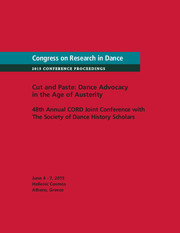No CrossRef data available.
Article contents
Collaborative Inquiry into the Culture of Dance Teaching
Published online by Cambridge University Press: 04 January 2013
Abstract
Last year I started a research project with the aim of pursuing collaboration among dance teachers. Through collaborative inquiry, the study aims to bring forth some core but unarticulated undercurrents within dance teaching, thus enhancing self-understanding within the rapidly changing circumstances of dance education. In this paper, I will first introduce some notions on the culture of dance teaching and then discuss collaboration in relation to reflective practice as well as to research practice. The main emphasis, however, is to explore the possibilities and challenges in collaborative inquiry as experienced by the participants.
- Type
- Research Article
- Information
- Copyright
- Copyright © The Author(s) 2009




